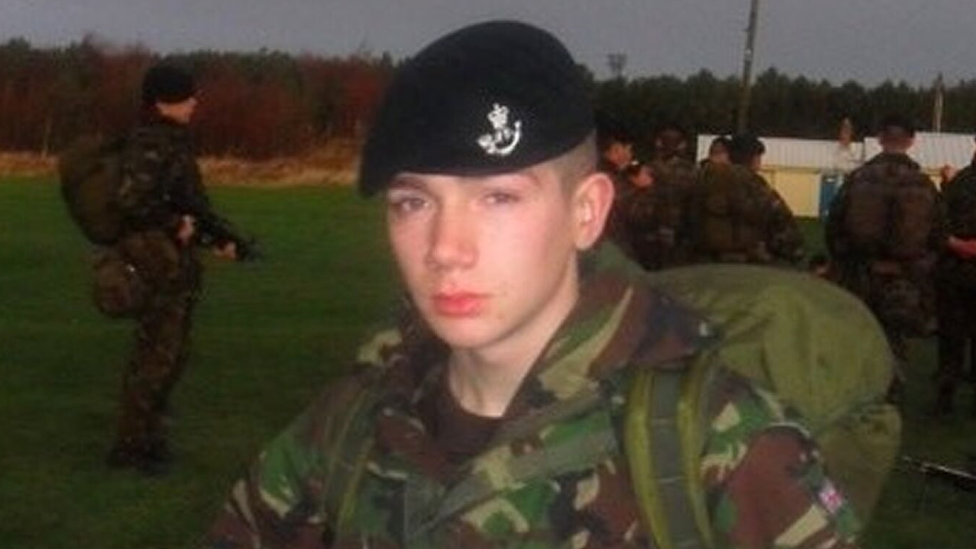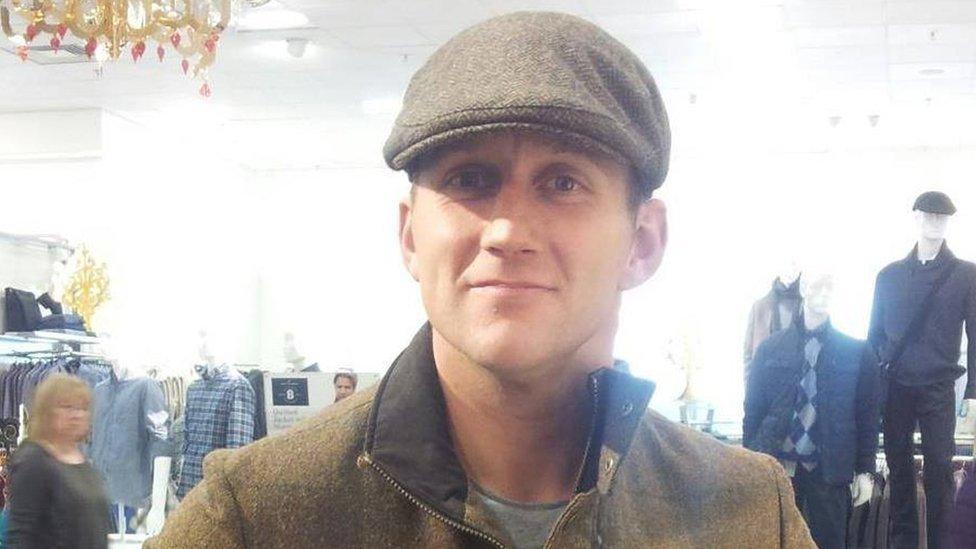Ballykinler inquest: Senior officer was stunned by soldier deaths
- Published

The inquest is examining the death of Rifleman Darren Mitchell in 2013
The former commanding officer of an army battalion based at Ballykinler in County Down has told an inquest he was stunned after two of his soldiers died at Abercorn Barracks less than three months apart.
Rifleman Darren Mitchell, 20, was found hanged in his room at the barracks in February 2013.
His death came after 30-year-old L/Cpl James Ross, from Leeds, was found hanged at the same Army base in December 2012.
An inquest is examining the deaths.
The men had previously been on active service in Afghanistan.
Both men were serving with the 2nd Battalion The Rifles.
Lieutenant colonel Mark Gidlow-Jackson said he was ultimately responsible for the soldiers under his command and to lose them was "awful".
The senior army officer, who served as commanding officer of 2nd Battalion The Rifles from June 2012 to April 2015, told the inquest he "was concerned that two such deaths were unusual" and in response initiated a number of steps to protect soldiers.
"Two tragedies so close together commanded immediate action," he said.
One of these steps involved the banning of alcohol in single officer's private rooms, which he said was a "hugely unpopular" decision.
He said the battalion sought to create "a culture that encourages people to come forward to share their problems".
He told the inquest that there was an increase of patrols of single accommodation by duty personnel in response to the two deaths.

The death of L/Cpl James Ross in December 2012 is also being examined at the inquiry
The former commanding officer added that steps were taken to improve access to sporting facilities "with the aim of encouraging single soldiers out of their rooms".
The inquest previously heard from the mother of Lance Corporal James Ross who said she did not believe it was acceptable that young men who had served in Afghanistan were sent to the "isolated" barracks.
The former commanding officer was asked about the Army's decision to transfer 2nd Battalion The Rifles to Lisburn in 2014, leaving Ballykinler without a resident battalion.
He said he partly supported the decision to move because of the "cases of suicide and self-harm" and added there was a wider view among unmarried soldiers that they wanted the opportunity to live a more normal off-duty life.
Lt Col Gidlow-Jackson said Ballykinler was a "marvellous" location to serve in if you were married, but added that if you were a single soldier it was "pretty isolated".
"It was the subject of lively debate, whether people wanted to stay in Ballykinler, live in Lisburn or move on somewhere else," he said.
The inquest is also examining the culture at Ballykinler at the time of the deaths.
It has heard there were several incidents of self-harm at that time.
'Inappropriate'
Earlier the inquest heard from Kenneth McQuillan, a former brigade welfare support officer with the Army welfare service, who offered to meet with Lt Col Gidlow-Jackson in February 2013, following the death of Rifleman Mitchell.
He said the meeting, which was an opportunity to outline the support they could provide, did not take place until four months later.
Mr McQuillan told the inquest that during the meeting Lt Col Gidlow-Jackson said: "we've done light and fluffy", when referring to the service which the Army Welfare Service provides.
The former commanding officer later accepted that he had used the phrase, which he described as "terrible" and "inappropriate".
He said he was not being "flippant about the issue" and the point he had been trying to make was that the battalion had already done a lot in terms of talking to soldiers and offering help.
The inquest continues.
- Published7 February 2019

- Published4 February 2019
